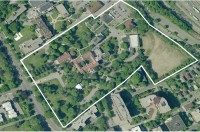White Plains Residents Blast North Broadway Landfill at City Council Meeting

Several White Plains residents last week were sharply critical of how the open space fill area at 52 N. Broadway has been handled by the property’s new owner and the city.
The residents made their comments about the fill area on the former Good Council campus during the Citizens to be Heard portion of the Feb. 4 Common Council meeting, the first time the session was televised. The half-hour “free-speech” session takes place before the official Council meeting begins and is not held to a set agenda.
The analysis of the open space fill area, prepared by Hauppauge, LI-based VHB that was submitted to White Plains Commissioner of Building Damon Amadio in January suggests, “the existing backfill material is not considered satisfactory and it may be necessary for same to be removed from each applicable building footprint (referring to the proposed residential development of the site).”
The analysis commissioned by the city is based on 14 samples taken from 11 borings at the site from late November to early December 2018.
The report continues: “Regardless of environmental impacts and the eventual plan for addressing the removal and/or capping of environmentally impaired soils, the generation and disposal of surplus soils should also be considered. VHB anticipates that surplus soils will likely be generated due to the proposed site redevelopment activities, and there is a potential that geotechnical specifications will require additional excavation/removal of the backfill. Off-site disposal of surplus soils should be considered due to the impairments detected.”
The history of toxicity at the former Good Counsel athletic field dates back to a period between 2004 and 2006 when backfill containing construction and demolition debris was deposited on the site. Upon inspection by the New York State Department of Environmental Conservation at that time, it was determined SVOCs were present in the fill materials at concentrations exceeding the NYSDEC objectives.
At last week’s meeting resident Deborah Zipf of 10 Stewart Place said she and other residents of her building were going to be monitoring the project being sought for 52 N. Broadway. “I can’t say we are exactly glad to have the report on the contaminated site,” she said.
Zipf said she was relieved that the report confirmed that the site was contaminated, which residents felt was the case all along. They expect the city to protect them. Remediation of the site will add dust, dirt and continuation to the neighborhood, she said.
Residents have questioned whether the former owners of the site, the Sisters of the Divine Compassion, were forthcoming about the status of the landfill when they decided to sell the former campus.
“The developer was aware of the contamination before they ever purchased the property because why else would they have a soil removal budget prepared with the property appraisal if there was nothing wrong with the soil,” Zipf said. The developer should take the project “back to the drawing board,” she said, adding: The contaminated site “is an insult to the neighborhood.”
Another 10 Stewart Place resident, Maria Gallagher, said the landfill results have made her more concerned about her health and angry. “If we, the nearby residents of this development plan, had not come forward” construction would have already begun, Gallagher said. The study was done after residents did research and commented at many Common Council meetings, she said. In 2005 a deed restriction was placed on the land and the cap was not supposed to be disturbed for 30 years, Gallagher said.
There are many other issues, including density, the local landmark status of the site, safety of the neighborhood and traffic that need to be analyzed by the city in addition to the contamination, Gallagher said.
Mayor Tom Roach said the consultant hired by the city will make a presentation at the March 4 meeting of the Common Council. The DEC will have the opportunity to address the property during the meeting and then the public will have the chance to address the Common Council, he said. Roach said his intention was to continue the public hearing at the April Common Council meeting.
“We’re taking this very seriously and I want to make sure everyone is heard,” Roach said.
